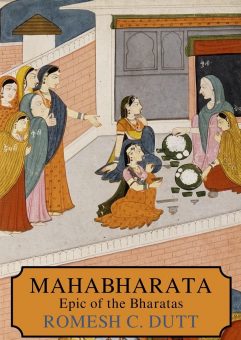Pious Krishna mounts the chariot, fondly greets his friends once more,
Leaves blue Jumna’s sacred waters for his Dwarka’s dear-loved shore.
Still Yudhishthir and his brothers, sad and sore and grieved at heart,
Followed Krishna’s moving chariot, for they could not see him part,
Krishna stopped once more his chariot, and his parting blessings gave,
Thus the chief with eyes of lotus spake in accents calm and brave:
“King of men! with sleepless watching ever guard thy Kingdom fair,
Like a father tend thy subjects with a father’s love and care,
Be unto them like the rain-drop nourishing the thirsty ground,
Be unto them tree of shelter shading them from heat around,
Like the blue sky ever bending be unto them ever kind,
Free from pride and free from passion rule them with a virtuous mind!”
Spake and left the saintly Krishna, pure and pious-hearted chief,
Sad Yudhishthir wended homeward and his heart was filled with grief.
Book IV. Dyuta (The Fatal Dice)
[238] Duryodhan came back from the Imperial Sacrifice filled with jealousy against Yudhishthir, and devised plans to effect his fall. Sakuni, prince of Gandhara, shared Duryodhan’s hatred towards the sons of Pandu, and helped him in his dark scheme.
Yudhishthir with all his piety and righteousness had one weakness, the love of gambling, which was one of the besetting sins of the monarchs of the day. Sakuni was an expert at false dice, and challenged Yudhishthir, and Yudhishthir held it a point of honour not to decline such a challenge.
He came from his new capital, Indra-prastha, to Hastina-pura the capital of Duryodhan, with his mother and brothers and Draupadi. And as Yudhishthir lost game after game, he was stung with his losses, and with the recklessness of a gambler still went on with the fatal game. His wealth and hoarded gold and jewels, his steeds, elephants and cars, his slaves male and female, his empire and possessions, were all staked and lost!
The madness increased, and Yudhishthir staked his brothers, and then himself, and then the fair Draupadi, and lost! And thus the Emperor of Indra-prastha and his family were deprived of every possession on earth, and became the bond-slaves of Duryodhan. The old king Dhrita-rashtra released them from actual slavery, but the five brothers retired to forests as homeless exiles.
Portions of Section lxv. and the whole of Sections lxix., lxxvi., and lxxvii. of Book ii. of the original text have been translated in this Book.
I. Draupadi in the Council Hall
[239] Glassed on Ganga’s limpid waters brightly shine Hastina’s walls!
Queen Draupadi duly honoured lives within the palace halls,
But as steals a lowly jackal in a lordly lion’s den,
Base Duryodhan’s humble menial came to proud Draupadi’s ken.
“Pardon, Empress,” quoth the menial, “royal Pandu’s righteous son,
Lost his game and lost his reason, Empress, thou art staked and won,
Prince Duryodhan claims thee, lady, and the victor bids me say,
Thou shalt serve him as his vassal, as his slave in palace stay!”
Pages: 1 2 3 4 5 6 7 8 9 10 11 12 13 14 15 16 17 18 19 20 21 22 23 24 25 26 27 28 29 30 31 32 33 34 35 36 37 38 39 40 41 42 43 44 45 46 47 48 49 50 51 52 53 54 55 56 57 58 59 60 61 62 63 64 65 66 67 68 69 70 71 72 73 74 75 76 77 78 79 80 81




